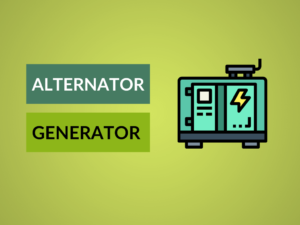What is AC?
Alternating current (AC) is a type of electrical current that periodically changes direction, reversing its flow. In an AC system, the voltage and current vary in a sinusoidal waveform. AC is commonly used for power distribution in homes and businesses as it can be easily transformed and transmitted over long distances.
Examples of AC:
- The electrical outlets in your home provide AC power for various appliances and devices.
- AC generators generate AC power that is used to power numerous electrical systems.
- AC motors, such as those found in refrigerators and air conditioners, convert electrical energy into mechanical energy.
What is a DC Generator?
A Direct Current (DC) generator is an electrical device that converts mechanical energy into DC electrical energy. Unlike AC generators, DC generators produce a constant voltage or current flow in only one direction. DC generators are commonly used in applications where a steady and controlled power supply is required.
Examples of DC Generators:
- Portable generators that provide DC power for camping or remote locations.
- DC generators used in vehicles to charge the battery or power the electrical systems.
- Solar panels that convert sunlight into DC electrical energy.
Differences between AC Generator and DC Generator:
| Difference Area | AC Generator | DC Generator |
|---|---|---|
| Voltage Type | Produces alternating voltage | Produces direct voltage |
| Current Direction | Current changes direction periodically | Current flows in only one direction |
| Power Generation | Produces power suitable for transmission over long distances | Produces power suitable for short-distance applications |
| Efficiency | AC generators are more efficient | DC generators have relatively lower efficiency |
| Frequency | AC generators operate at various frequencies depending on the application | DC generators do not have a specific frequency |
| Power Distribution | AC power can be easily transformed and transmitted over long distances | DC power is not typically used for long-distance transmission |
| Motor Operation | AC motors are commonly used with AC generators | DC motors are commonly used with DC generators |
| Complexity | AC generator design is more complex | DC generator design is relatively simpler |
| Cost | AC generators are generally more expensive | DC generators are comparatively cheaper |
| Power Control | AC power can be easily controlled using transformers and switches | DC power control requires additional circuitry |
Conclusion:
In summary, AC generators produce alternating voltage and current, suitable for long-distance transmission, while DC generators produce direct voltage and current, suitable for specific applications. AC generators are more efficient and complex, whereas DC generators are simpler and cheaper. The choice between AC and DC generators depends on the specific requirements of the electrical system or application.
People Also Ask:
1. What is the main difference between AC and DC generators?
The main difference is that AC generators produce alternating voltage and current, whereas DC generators produce direct voltage and current.
2. Can an AC generator produce DC power?
While AC generators primarily produce AC power, it is possible to use additional components like rectifiers to convert AC power into DC power.
3. Which type of generator is more commonly used in homes?
AC generators are more commonly used in homes as they provide power suitable for long-distance transmission and can be easily transformed and distributed.
4. Can a DC generator produce AC power?
DC generators produce direct voltage and current, but with external components like inverters, the DC power can be converted into AC power.
5. Which type of generator is more efficient?
AC generators are generally more efficient compared to DC generators due to their ability to transmit power over long distances effectively.


